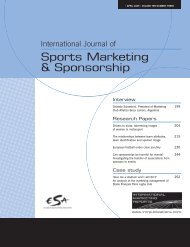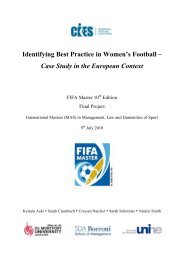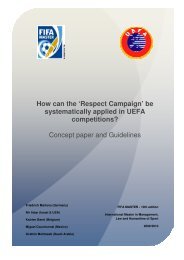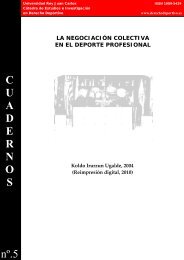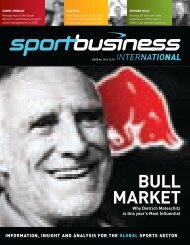Sports Marketing & Sponsorship - FIFA/CIES International University ...
Sports Marketing & Sponsorship - FIFA/CIES International University ...
Sports Marketing & Sponsorship - FIFA/CIES International University ...
- No tags were found...
You also want an ePaper? Increase the reach of your titles
YUMPU automatically turns print PDFs into web optimized ePapers that Google loves.
Is motorsport “a race out of place”?RESEARCH PAPER“environmental stress from worsening damage to ourland, water, forests and fisheries”, “climate stress fromchanges in the makeup of our atmosphere” and“economic stress resulting from instabilities in theglobal economic system” (Homer-Dixon, 2006, p.11).He adds to this list two “multipliers”, which he argues“combine with the five stresses to make breakdownmore likely, widespread and severe. The first multiplieris the rising speed and global connectivity of ouractivities, technologies and societies. The second isthe escalating power of small groups to destroy thingsand people” (Homer-Dixon, 2006, p.13).A key argument of Homer-Dixon is that, incombination, any two or more of these seven factorscan produce negative synergies, perhaps leading towhat he calls “synchronous failure”. In response tosceptics who claim his views are alarmist, he argues:“we can’t know for sure what our future holds… butwe can still say confidently that we’re sliding towardsa planetary emergency; that the risk of major socialbreakdown in general – the result of something likesynchronous failure specifically – is growing” (Homer-Dixon, 2006, pp.16-19).This paper concentrates on the importance of justtwo of the seven factors identified by Homer-Dixon –energy stress, or ‘peak oil’, and global climate change.As Homer-Dixon argues (p.12), “energy is society’scritical master resource: when it’s scarce and costly,everything we try to do becomes far harder”. Globalclimate change is now recognised as presenting anemergency. These two issues are the focus of thispaper because they are most clearly linked to theimpact of motorsport on sustainability.Peak oil is arguably one of the most importantissues that will affect society’s ability to maintainconsumption-based lifestyles (Newman et al, 2009).Peak oil is the time at which the world’s production ofoil reaches a peak, after which production mustinevitably decline, as has already occurred in 54 ofthe 65 most important oil-producing nations (Aleklett,2006). The precise effects of peak oil are difficult topredict, but given that “oil is the lifeblood of moderncivilisation” (Hirsch et al, 2006), the potentialoutcomes of peak oil are, at the very least, disruptive.Growing numbers of researchers expect the peak tooccur within the next few years (Kunstler, 2006;Leggett, 2006; Vidal, 2005).Some researchers assume that the ‘laws’ ofeconomics mean that peak oil will promote higherprices, which will “provoke more drilling and thus willrender more oil” (Shah, 2004, p.26) or will lead to asmooth transition from oil to other products and formsof energy. Yet a growing number of researchersquestion such optimism. They point out that even ifhuge new oil fields can be found (an increasinglyunlikely scenario), it will take a “long time to produceit, and a long time to transport it to market” (Leggett,2006, p.78). They warn that no combination of newtechnologies or energy sources can be developedquickly enough to replace oil in time to avoidwidespread economic collapse (Deffeyes, 2005;Goodstein, 2005; Hirsch, 2005; Kunstler, 2006).A key consideration regarding the impact of peak oilis its timing: some researchers contend that if peak oiloccurs within the next 10-20 years, it puts the wellbeingof both industrial and post-industrial societies atrisk (Parker, 2005), possibly leading to what has beendescribed as a “second great depression”, swelling thenumbers living in poverty and leading to the collapseof globalisation (Campbell, 2005).Curtis (2007) argues that globalisation may bedestabilised by a combination of the “predictedimpacts of global warming and peak oil (depletion)”.These are likely to cause disruption to transport andincrease business risk and food and goods prices, and“the long distance exploitation of cheap labour maylose much of its economic profitability in comingdecades, and supply chains may contract to regionaland local lengths” (Curtis, 2007, p.385).Scientists are reporting in the strongest terms thatcivilisation itself is threatened by global warming, anissue that can no longer afford to be ignored. “Recentgreenhouse gas (GHG) emissions place the Earthperilously close to dramatic climate change that couldrun out of our control, with great dangers for humansand other creatures” (Hansen et al, 2007). These are72 <strong>International</strong> Journal of <strong>Sports</strong> <strong>Marketing</strong> & <strong>Sponsorship</strong> ● OCTOBER 2009 ●





